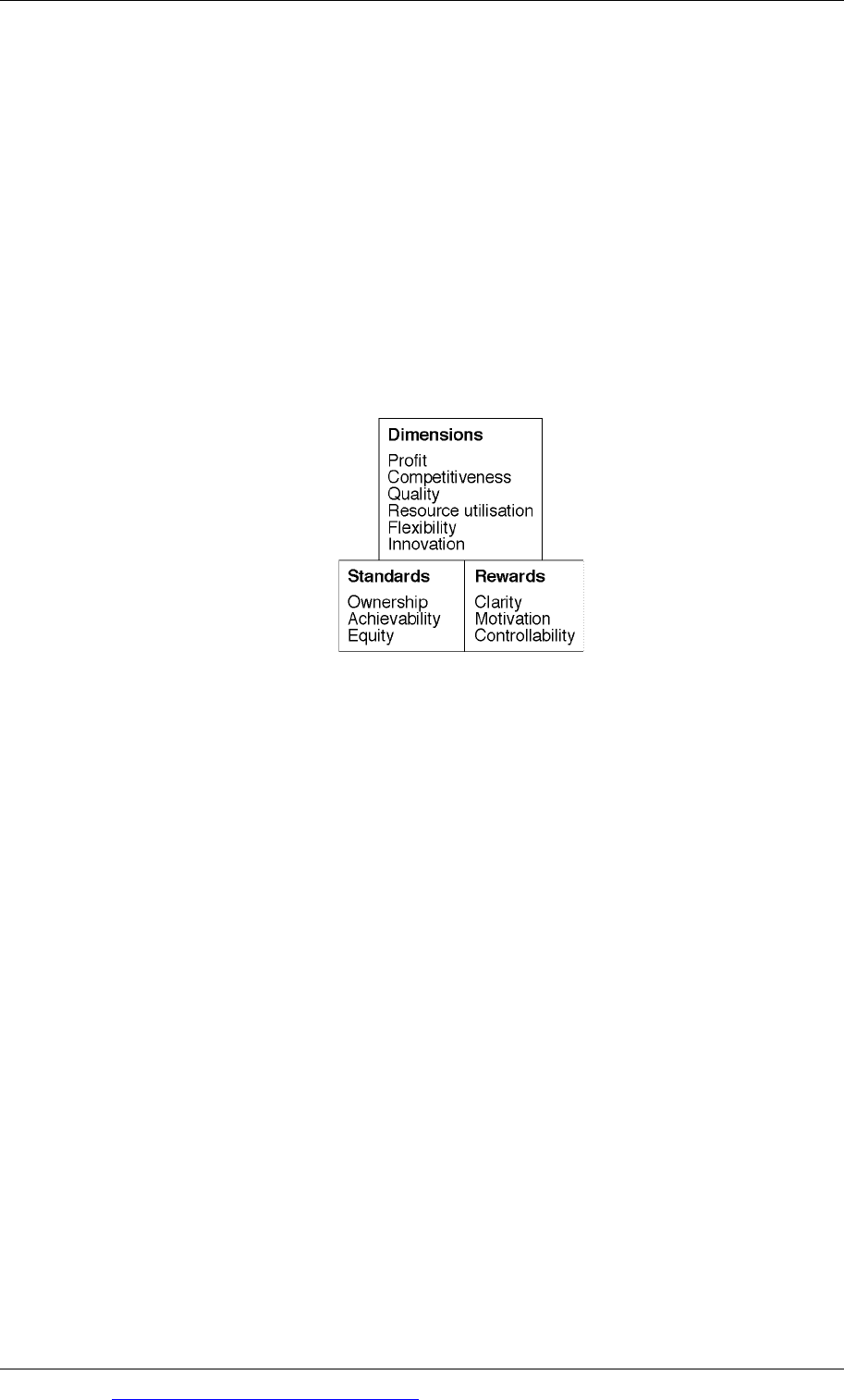ACCA F5 Performance Management - 2010 - Study text - Emile Woolf Publishing
Подождите немного. Документ загружается.


Chapter 12: The scope of performance measurement
© EWP Go to www.emilewoolfpublishing.com for Q/As, Notes & Study Guides 335
Performance measurement in service industries: the building block
model of Fitzgerald and Moon
The characteristics of services and service industries
Performance in service industries: Fitzgerald and Moon
Dimensionsof performance
Standards of performance
Rewards for performance
6 Performance measurement in service industries: the
building block model of Fitzgerald and Moon
6.1 The characteristics of services and service industries
Many organisations provide services rather than manufacture products. There are
many examples of service industries: hotels, entertainment, the holiday and travel
industries, professional services, banking, cleaning services, and so on.
Performance measurement for services may differ from performance measurement
in manufacturing in several ways:
Simultaneity. With a service, providing the service (‘production’) and receiving
consumption the service (‘consumption’ by the customer) happen at the same
time. In manufacturing, the making of the product happens before the customer
buys it.
Perishability. It is impossible to store a service for future consumption: unlike
manufacturing and retailing, there is no inventory of unused services. The
service must be provided when the customer wants it.
Heterogeneity. A product can be made to a standard specification. With a
service provided by humans, there is variability in the standard of performance.
The service is different in some way each time that it is provided. For example,
even if they perform the same songs at several concerts, the performance of a
rock band at a series of concerts will be different each time.
Intangibility. With a service, there are many intangible elements of service that
the customer is given, and that individual customer might value. For example, a
high quality of service in a restaurant is often intangible, but noticed and valued
by the customer.
Since services differ to some extent from products, should performance setting and
performance measurement be different in service companies, compared with
manufacturing companies?

Paper F5: Performance management
336 Go to www.emilewoolfpublishing.com for Q/As, Notes & Study Guides © EWP
6.2 Performance in service industries: Fitzgerald and Moon
Fitzgerald and Moon (1996) suggested that a performance management system in a
service organisation can be analysed as a combination of three building blocks:
dimensions
standards, and
rewards.
These are shown in the following diagram, which is known as the ‘building block
model’.
Building blocks for performance measurement systems
(Fitzgerald and Moon 1996)
6.3 Dimensions of performance
Dimensions of performance are the aspects of performance that are measured. To
establish a performance measurement system for a service industry, a decision has
to be made about the dimensions of performance that should be used for measuring
performance.
Research by Fitzgerald and others (1993) and by Fitzgerald and Moon (1996)
concluded that there are six aspects to performance measurement that link
performance to corporate strategy. These are:
profit (financial performance)
competitiveness
quality
resource utilisation
flexibility
innovation.
Performance measures should be established for each of these six dimensions. Some
performance measures that might be used for each dimension are set out in the
following table.

Chapter 12: The scope of performance measurement
© EWP Go to www.emilewoolfpublishing.com for Q/As, Notes & Study Guides 337
Dimension of
performance
Possible measure of performance
Financial
performance
Profitability
Growth in profits
Profit margin
Note: Return on capital employed is possibly not so relevant
in a service industry, where the company employs fairly
small amounts of capital.
Competitiveness
Growth in sales
Retention rate for customers (or percentage of customers
who buy regularly: ‘repeat sales’)
Success rate in converting enquiries into sales
Market share
Service quality
Number of complaints
Whether the rate of complaints is increasing or decreasing
Customer satisfaction, as revealed by customer opinion
surveys
Number of errors discovered
Flexibility
Possibly the mix of different types of work done by
employees, to assess the flexibility of the work force
Possibly the speed in responding to customer requests, to
assess flexibility of response to customers’ needs
Resource
utilisation
Efficiency/productivity measures, such as material wastage
rates, rates of loss in production, labour efficiency
Utilisation rates: percentage of available time utilised in
‘productive’ activities, machine utilsation
Innovation
Number of new services offered
Percentage of total sales income that comes from services
introduced in the last one or two years
Other measures of performance might be appropriate for each dimension,
depending on the nature of the service industry. However, this framework of six
dimensions provides a structure for considering what measures of performance
might be suitable.
The dimensions of performance should also distinguish between:
‘results’ of actions taken in the past, and
‘determinants’ of future performance.
Some dimensions of performance measure the results of decisions that were taken
in the past, that have now had an effect. Fitzgerald and Moon suggested that results
of past actions are measured by:
financial performance and
competitiveness.

Paper F5: Performance management
338 Go to www.emilewoolfpublishing.com for Q/As, Notes & Study Guides © EWP
Other dimensions of performance will not have an immediate effect, and do not
measure the effects of decisions taken in the past. Instead they measure progress
towards achieving strategic objectives in the future. The ‘drivers’ or ‘determinants’
of future performance are:
quality
flexibility
resource utilisation
innovation.
These are dimensions of competitive success now and in the future, and so are
appropriate for measuring the performance of current management. Measuring
performance in these dimensions ‘is an attempt to address the short-termism
criticism frequently levelled at financially-focused reports’ (Fitzgerald). This is
because they recognise that by achieving targets now, future performance will
benefit. Improvements in quality, say, might not affect profitability in the current
financial period, but if these quality improvements are valued by customers, this
will affect profits in the future.
6.4 Standards of performance
The second part of the framework for performance measurement suggested by
Fitzgerald and Moon relates to setting expected standards of performance, once the
dimensions of performance have been selected. This considers behavioural aspects
of performance targets.
There are three aspects to setting standards of performance:
To what extent do individuals feel that they own the standards that will be used
to assess their performance? Do they accept the standards as their own, or do
they feel that the standard shave been imposed on them by senior management?
Do the individuals held responsible for achieving the standards of performance
consider that these standards are
achievable, or not?
Are the standards fair (‘equitable’) for all managers in all business units of the
entity?
It is recognised that individuals should ‘own’ the standards that will be used to
assess their performance, and managers are
more likely to own the standards when
they have been involved in the process of setting the standards
.
It has also been argued that if an individual accepts or ‘owns’ the standards of
performance, better performance will be achieved when the standard is more
demanding and difficult to achieve than when the standard is easy to achieve. This
means that the standards of performance that are likely to motivate individuals the
most are standards that will not be achieved successfully all the time. Budget targets
should therefore be challenging, but not impossible to achieve.

Chapter 12: The scope of performance measurement
© EWP Go to www.emilewoolfpublishing.com for Q/As, Notes & Study Guides 339
Finding a balance between standards that the company thinks are achievable and
standards that the individual thinks are achievable can be a source of conflict
between senior management and their subordinates.
6.5 Rewards for performance
The third aspect of the performance measurement framework of Fitzgerald and
Moon is rewards. This refers to the structure of the rewards system, and how
individuals will be rewarded for the successful achievement of performance targets.
This aspect of performance also has behavioural implications.
One of the main roles of a performance measurement system should be to ensure
that strategic objectives are achieved successfully, by linking operational
performance with strategic objectives.
According to Fitzgerald, there are three aspects to consider in the reward system.
The system of setting performance targets and rewarding individuals for
achieving those targets must be clear to everyone involved. Provided that
managers accept their performance targets,
motivation to achieve the targets
will be greater when the targets are
clear (and when the managers have
participated in the target-setting process).
Employees may be motivated to work harder to achieve performance targets
when they are
rewarded for successful achievements, for example with the
payment of an annual bonus.
Individuals should only be held responsible for aspects of financial
performance that they can control
. This is a basic principle of responsibility
accounting. A common problem, however, is that some costs are incurred for the
benefit of several divisions or departments of the organisation. The
costs of
these shared services
have to be allocated between the divisions or departments
that use them. The principle that costs should be controllable therefore means
that the allocation of shared costs between divisions must be fair. In practice,
arguments between divisional managers often arise because of disagreements as
to how the shared costs should be shared.

Paper F5: Performance management
340 Go to www.emilewoolfpublishing.com for Q/As, Notes & Study Guides © EWP

© EWP Go to www.emilewoolfpublishing.com for Q/As, Notes & Study Guides 341
Paper F5
Performancemanagement
CHAPTER
13
Divisional performance
Contents
1 Divisional performance evaluation
2 Return on Investment (ROI)
3 Residual income (RI)
4 Divisional performance and depreciation

Paper F5: Performance management
342 Go to www.emilewoolfpublishing.com for Q/As, Notes & Study Guides © EWP
Divisional performance evaluation
Decentralisation of authority
Benefits of decentralisation
Disadvantages of decentralisation
Controllable profit and traceable profit
1 Divisional performance evaluation
1.1 Decentralisation of authority
Decentralisation involves the delegation of authority within an organisation. Within
a large organisation, authority is delegated to the managers of cost centres, revenue
centres, profit centres and investment centres.
A divisionalised structure refers to the organisation of an entity in which each
operating unit has its own management team which reports to a head office.
Divisions are commonly set up to be responsible for specific geographical areas or
product lines within a large organisation.
The term ‘decentralised divisionalised structure’ means an organisation structure in
which authority has been delegated to the managers of each division to decide
selling prices, choose suppliers, make output decisions, and so on.
1.2 Benefits of decentralisation
Decentralisation should provide several benefits for an organisation.
Decision-making should improve, because the divisional managers make the
tactical and operational decisions, and top management is free to concentrate on
strategy and strategic planning.
Decision-making at a tactical and operational level should improve, because the
divisional managers have better ‘local’ knowledge.
Decision-making should improve, because decisions will be made faster.
Divisional managers can make decisions ‘on the spot’ without referring them to
senior management.
Managers may be more motivated to perform well if they are empowered to
make decisions and rewarded for performing well against fair targets
Divisions provide useful experience for managers who will one day become top
managers in the organisation.
Within a large multinational group, there can be tax advantages in creating a
divisional structure, by locating some divisions in countries where tax
advantages or subsidies can be obtained.

Chapter 13: Divisional performance
© EWP Go to www.emilewoolfpublishing.com for Q/As, Notes & Study Guides 343
1.3 Disadvantages of decentralisation
Decentralisation can lead to problems.
The divisional managers might put the interests of their division before the
interests of the organisation as a whole. Taking decisions that benefit a division
might have adverse consequences for the organisation as a whole. When this
happens, there is a lack of ‘goal congruence’.
Top management may lose control over the organisation if they allow
decentralisation without accountability. It may be necessary to monitor
divisional performance closely. The cost of such a monitoring system might be
high.
It is difficult to find a satisfactory measure of historical performance for an
investment centre that will motivate divisional managers to take the best
decisions. For example, measuring divisional performance by Return on
Investment (ROI) might encourage managers to make inappropriate long-term
investment decisions. This problem is explained in more detail later.
Economies of scale might be lost. For example, a company might operate with
one finance director. If it divides itself into three investment centres, there might
be a need for four finance directors – one at head office and one in each of the
investment centres. Similarly there might be a duplication of other systems, such
as accounting system and other IT systems.
1.4 Controllable profit and traceable profit
Profit is a key measure of the financial performance of a division. However, in
measuring performance, it is desirable to identify:
costs that are controllable by the manager of the division, and also
costs that are traceable to the division. These are controllable costs plus other
costs directly attributable to the division over which the manager does not have
control.
There may also be an allocation of general overheads, such as a share of head office
costs.
In a divisionalised system, profit centres and investment centres often trade with
each other, buying and selling goods and services. These are internal sales, priced at
an internal selling price (a ‘transfer price’). Reporting systems should identify
external sales of the division and internal sales as two elements of the total revenue
of the division. Transfer prices are the subject of the next chapter.

Paper F5: Performance management
344 Go to www.emilewoolfpublishing.com for Q/As, Notes & Study Guides © EWP
$
External sales 600,000
Internal sales 150,000
Total sales 750,000
Costs controllable by the divisional manager:
Variable costs 230,000
Contribution 420,000
Controllable fixed costs 140,000
Profit attributable to the manager (controllable profit) 280,000
Costs traceable to the division but outside the manager’s control 160,000
Profit traceable to the division 120,000
Share of general overheads 30,000
Net profit 90,000
Notes
Controllable profit is used to assess the manager and is therefore sometimes
called the managerial evaluation.
Traceable profit is used to assess the performance of the division and is
sometimes called the economic evaluation.
The apportionment of general head office costs should be excluded from the
analysis of the manager’s performance and the division’s performance.
These profit measures can be used with variance analysis, ratio analysis, return on
investment, residual income and non-financial performance measurements to
evaluate performance.
